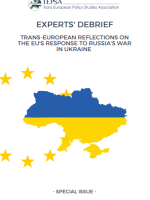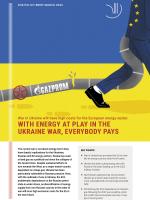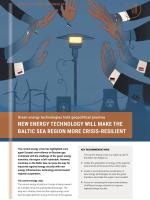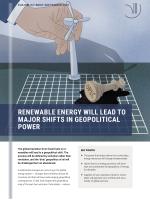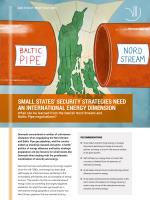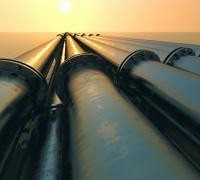Experts’ Debrief
Severing energy ties with Russia will put a high economic strain on the European companies and individual consumers in the short term but can accelerate the EU’s energy transition and boost its security of supply long-term. The economic impact of the high energy prices can be partially mitigated by a set of emergency and long-term measures outlined by the EU, such as the “Energy Prices Toolbox”.
Russia’s military invasion of Ukraine put the issue of energy supply at the top of the EU’s high-security agenda and led to a U-turn policy shift in its energy relations with Russia. If for many years there was a discrepancy between Central and Eastern Europe which largely perceived Moscow’s use of fossil fuel exports as an instrument of political pressure, and some western countries, such as Germany, which insisted on the economic dimension of EU-Russia energy cooperation and projects such as Nord Stream 2, now the views across the EU are aligned. However, abrupt diversification of the EU’s energy supply poses a major challenge for two main reasons. First, the EU is currently highly dependent on Russian gas (40%) and oil (30%), with the potential diversification of the gas supply proving particularly problematic due to insufficient gas infrastructure and limited availability of liquified gas. Second, the ambitious targets outlined in the European Green Deal, such as cutting the net greenhouse gas emissions by at least 55% from 1990 levels by 2030, rule out some potential short-term solutions that contradict the EU’s climate agenda – e.g., burning coal.
In light of the current developments in Ukraine, the International Energy Agency (IEA) introduced a 10-point Action plan to swiftly minimize the EU’s dependence on Russian gas by one-third by the end of this year, while staying in line with the climate protection targets. In a similar vein, the European Commission (EC) launched the “REPowerEU” plan aimed at complete elimination of the EU’s dependence on the Russian fossil fuels by 2030, with a strong emphasis on natural gas. The proposed measures revolve around diversification of gas supplies, the introduction of minimum storage requirements, increased generation from low-emission energy sources (including nuclear), strengthened efficiency measures, and further investments in large-scale renewable projects.
Gas diversification points to the introduction of alternative supply routes, whereby LNG infrastructure stands crucial. The EU’s yearly LNG import capacity accounts for 157 bcm of regasified natural gas, which at full capacity is sufficient to cover nearly 40% of the overall demand. The current LNG imports are only partially utilized, amounting to 80 bcm/year, leaving space for improvement. However, 70% of the LNG market operates with longterm (10+ year) agreements, and the major LNG suppliers – the US, Australia, and Qatar – are already operating at nearly full capacity. The stiffness of the LNG market combined with world-wide gas storage filling in response to developments in Ukraine does not leave much space for the EU to maneuver. In the near term, accessing cargoes destined for other destinations is the best shot the EU has; this, however, will come at an increasingly high price. Furthermore, if the LNG share in the EU is to be increased further, to meet the demand, new infrastructure capacity building is necessitated in both import as well as export destinations.
The combination of expensive LNG imports (prices of liquified gas and new LNG infrastructure) and the accelerated pace of low carbon energy transition is going to be costly for European businesses and individual consumers alike. The impact of the high energy prices might be partially mitigated by a number of measures proposed by the EC. The EC’s “Energy Price Toolbox” adapted in October 2021 seeks to mitigate immediate energy price surges impact and boost resilience against shocks. On a national level, this measure covers income support to households, state aid for private businesses as well as tax reductions. In the longer term, measures focus on further investments in renewables and energy efficiency, which will improve states’ overall energy security. Following the Russian invasion of Ukraine, in March 2022 the EC issued also additional guidance for energy price regulation in exceptional circumstances, such as direct support for companies affected by high energy prices and measures to minimize energy price volatility in the long run. Furthermore, the Commission will consult the Member States on the development of a Temporary Crisis Framework.
Oil is a more palpable resource than gas, enabling the transport of it via different means, including pipelines, road, rail, and sea. Therefore, maneuvering around the cut-off of Russian oil will prove to be less difficult in the short run, as replacement barrels are available for immediate supply. The release of oil reserves will play a crucial role before alternative energy sources can be utilized. In a long-term perspective, as the Secretary-General of OPEC noted, the permanent loss of the Russian oil volumes to the EU simply cannot be replaced at the current levels of consumption. Meeting the EU’s demand with non-Russian oil depends on the global oil capacity which is insufficient; this will inevitably drive the prices up. The spikes can already be observed: at one point this week approaching $139 a barrel, which indicates a jump of over 30% as compared to pre-war levels. While measures are available short-term, the EU must engage in an accelerated oil phase-out and transition to renewables quicker than intended.
This text by Izabela Surwillo & Veronika Slakaityte was originally published in a briefing paper by TEPSA. Read the full briefing paper here.
DIIS Eksperter


